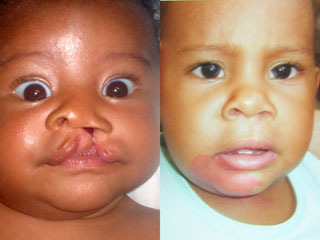New York Center for Facial Plastic Surgery
Schedule a consultation

Information About Dr. Jacono, Facial Reconstructive Surgery Specialist

Facial reconstructive surgery is a set of specialized corrective procedures. These treatments are for those whose faces have been affected by diseases, trauma, or congenital deformities. Reconstructive procedures are also effective for those who have been disfigured by previous surgical experiences.
Facial reconstructive surgery aims not only to improve appearance but to restore functionality to damaged structures. Cleft lip and palate repair, for example, provides both aesthetic and practical results. Often, reconstructive surgical procedures dramatically improve the quality of life.
There are many facial reconstructive surgical procedures. Some focus on rebuilding facial structures with tissue from the patient’s body. Others directly manipulate and rearrange problem areas with incisions.
Patients are usually sedated during reconstructive surgery. Sometimes, patients may instead opt for local anesthesia, which numbs the face. Local anesthesia does induce unconsciousness.
New York Center for Facial Plastic Surgery
Schedule a consultation

Dr. Jacono is dedicated to helping patients reconstruct their faces. The most common reasons patients undergo reconstructive surgery include physical trauma, birth defects, and cancer-related complications.
Dr. Jacono has unparalleled expertise in a wide array of reconstructive procedures. A few of these are outlined below.
MOHS surgery treats skin cancer patients affected by basal and squamous cell carcinomas. Physicians remove affected skin and examine it under a microscope. By removing tissue, doctors can be sure that all cancerous tissue has been excised. MOHS surgery is usually performed by a specialized dermatological surgeon who only performs skin cancer removal.
After MOHS surgery, there is usually a hole in the skin. Dermatological surgeons then refer patients to Dr. Jacono for reconstructive work. Dr. Jacono reconstructs facial tissue, restoring the skin’s natural, healthy appearance.
Facial injuries can occur in a fraction of a second but cause life-long emotional and physical trauma. Although early treatment in an emergency room is essential, permanent scarring can distort facial features.
Dr. Jacono regularly treats patients disfigured by facial injuries. During the consultation, he assesses the thickness, texture, and color of scars before deciding on the best scar removal techniques. He then excises these scars and rebalances facial features with innovative tissue rearrangement.
If the face’s bony architecture has been damaged, Dr. Jacono uses three-dimensional computer imaging to guide his process. This allows him to deliver the most comprehensive outcomes.
Nerve damage may cause distortion, facial imbalances, and asymmetrical expressions. Nerve injuries also affect chewing, fluid retention while drinking, and nasal breathing. In children, facial paralysis occurs at birth or after brain tumor resection. Adults may experience paralysis following an episode of Bell’s Palsy, acoustic neuroma, or trauma.
Dr. Jacono performs a few procedures to treat these issues. If the brow and forehead droop, he performs either a brow lift or an endoscopic forehead lift. This repositions tissue and muscle, improving both vision and expression. If blinking has been affected, he places a gold weight in the upper eyelid. This helps the eyelid close. Lastly, if a patient has lost the ability to smile, Dr. Jacono performs a temporalis tendon transfer procedure. This transfers a section of the tendon from the muscle used to chew and helps the mouth move more easily.
Cleft lips and cleft palates are birth defects that develop in the womb. Normally, the mouth and nose of a fetus develop between the first 6 and 12 weeks of pregnancy. In some cases, parts of the lips and roof of the mouth don’t grow together. This causes cleft lips, cleft palates, or both.
During cleft lip surgery, Dr. Jacono makes an incision on each side of the cleft, from the lip to the nostril. The two sides of the lip are then sutured together. During cleft palate surgery, Dr. Jacono draws tissue from either side of the mouth to rebuild the palate.
Depending on the size, shape, and severity of the cleft, more than one surgery may be required. Without cleft treatment, patients have trouble eating and drinking, and may experience speech delays.
Patients with microtia suffer from malformed or misshapen ears. Microtia occurs in about 1 in 5,000 to 7,000 births.
Typical microtia—also known as grade 3—makes the ear look like a sausage-shaped wrinkle. Grade 2 microtia looks more like a miniature ear. Grade 1 microtia is an ear with minimal deformation. 90% of the time, patients only experience microtia in one ear, but sometimes, both are malformed.
Microtia reconstruction requires 4 operations spread out over a year. The first procedure harvests cartilage from the ribcage and carves the cartilage into the framework of an ear. This is then placed over the defective ear. Subsequent changes involve small alterations, including the creation of an ear lobule.
Burn injuries account for over 100,000 hospital admissions every year. Burn victims are most commonly toddlers (ages 2 through 4) and adolescents (ages 17 to 25). Injuries to the head and neck comprise almost 50% of all burn injuries.
Dr. Jacono specializes in facial burn reconstruction. He aims to improve the functionality of the face and restore a more normal aesthetic appearance. He uses facial flaps, skin expanders, laser technology, and corrective makeup to achieve the most dramatic outcomes.

Dr. Jacono is a dual board-certified facial plastic and reconstructive surgeon with over 20 years of experience in the field. Dr. Jacono specializes in a variety of facial reconstructive procedures and delivers the most comprehensive results.
To see if you are a candidate for revision or reconstructive surgery, please contact Dr. Jacono’s offices in Manhattan or on Long Island.

Accessibility: If you are vision-impaired or have some other impairment covered by the Americans with Disabilities Act or a similar law, and you wish to discuss potential accommodations related to using this website, please contact our Accessibility Manager at (212) 570-2500 .